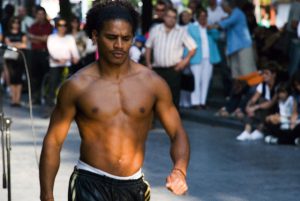One of the interesting facts about Polish grammar is that we have three singular genders but only two plural genders. Although there are „only” two, they are a huge problem for many.

But it doesn’t mean that it’s diffcult to learn to use them. But let’s start from the beginning. Do you know these nouns: „mężczyzna” (a man) — „on”, „kot” (a cat) — „on”, „komputer” (a computer) — „on”, „kobieta” (a woman) — „ona”, „gazeta” (a newspaper) — „ona”, krzesło (a chair) — „ono”? Well, now you do. Three of them are masculine, two are feminine and one is neuter. We can say it by examining the endings.
Now let’s create plural forms of each of them. It goes like this: mężczyźni, koty, komputery, kobiety, gazety, krzesła. Now we would like to match each of these words to a gender. Our choice is: męskoosobowy (masculine-personal) or niemęskoosobowy (non-masculine-personal). Now I’ll answer to two questions which could be in your head at the moment: how and what for?
First — what for? It should give you motivation to learn it (I hope). We need it to put for example adjectives correctly. It’s important.
Now the part you probably can’t wait for. How do we tell masculine-personal nouns from non-masculine-personal nouns? I guess it’s the biggest problems for learners. But you know what? In a minute it won’t be a problem for you. The rule is really simple!
The dictionary about „rodzaj niemęskoosobowy”: a feature of plural nouns which describe people of feminine gender, animals, objects, phenomenons and terms. All in all, almost everything has non-masculine-personal gender!
Only people of masculine gender (that is — men) has masculine-personal gender! That’s so easy! Even the name says it all: masculine-personal — there’s a person who is a man! Let’s take a look at our list of nouns: mężczyźni, koty, komputery, kobiety, gazety, krzesła. Which of them can describe men? That’s right — only „mężczyźni”. So „mężczyźni” is an example of masculine-personal gender. The rest are non-masculine-personal, since they are not men. Let’s add some other masculine-personal nouns to our list, just to rebalance: „policjanci” (policemen), „nauczyciele” (teachers), „ludzie” (people), „dziadkowie” (grandparents/ grandfathers).
Let’s consider an adjective „dobry”. It has forms: „dobrzy” for męskoosobowy and „dobre” for niemęskoosobowy. So, as we have already matched the nouns with genders, we can write:
- Dobrzy mężczyźni, policjanci, nauczyciele, ludzie, dziadkowie.
- Dobre koty, komputery, kobiety, gazety, krzesła.
Now a pronoun „ten” (this). Its forms for rodzaj męskoosobowy and niemęskoosobowy: ci, te. Again we know how to connect the pronoun with the nouns correctly! Let’s do it!
- Ci mężczyźni, policjanci, nauczyciele, ludzie, dziadkowie.
- Te koty, komputery, kobiety, gazety, krzesła.
Alright. Now your turn.
Comment the post here or on Facebook.
Choose the right gender for each noun.
- Klawiatury (keyboards) — …
- Gry (games) — …
- Uczestnicy (participants) — …
- Kalkulatory (calculators) — …
- Spodnie (trousers) — …
- Aktorzy (actors) — …
The answers to the exercise are below — press ctrl + A on your keyboard to see them.
- Klawiatury (keyboards) — niemęskoosobowy.
- Gry (games) — niemęskoosobowy.
- Uczestnicy (participants) — męskoosobowy (there can be men among them).
- Kalkulatory (calculators) — niemęskoosobowy.
- Spodnie (trousers) — niemęskoosobowy.
- Aktorzy (actors) — męskoosobowy.
Write the correct form of each adjective.
- (Dobry — good) … chłopcy (boys).
- (Zły — bad, wrong) … dziewczynki (girls).
- (Dziwny — weird, strange) … kierowcy (drivers).
- (Głośny — loud) … gitarzyści (guitarists).
- (Długi — long) … książki (books).
- (Mądry — wise) … podręczniki (textbooks).
- (Doświadczony — experienced) … ojcowie (fathers).
The answers to the exercise are below — press ctrl + A on your keyboard to see them.
- Dobrzy chłopcy (boys).
- Złe dziewczynki (girls).
- Dziwni kierowcy (drivers).
- Głośni gitarzyści (guitarists).
- Długie książki (books).
- Mądre podręczniki (textbooks).
- Doświadczeni ojcowie (fathers).
The image comes from flickr.com.